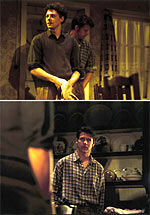|
Loading
|
|
|
The York Realist
by Peter Gill
Royal Court, London
Review by Charlotte Cooper, Rainbownetwork, January 2002
Peter Gill’s new play is set in the Yorkshire countryside in the early 1960s and concerns a relationship between two men which bridges the gap between two different worlds.
Set at a point of social change, ‘The York Realist’ explores the shifting values of rural and urban England. John is an assistant theatre director of an amateur production of the Mystery Plays. A middle class Londoner, he has come to George’s house to persuade him not to give up his role in the play. George, a farm hand, is a talented actor. Mollycoddled by his mother as well as neighbour, Doreen, he is the man of the house.
The two men are secret lovers, partly because of the fact that gay sex is still a criminal offence, and partly because of stifling social attitudes in 1960s religious rural communities. There are hints in the play that George’s family know about his homosexuality, after all he bedded his brother in law, but for the main part they remain tight-lipped.
The crux of the play centres on the problem of how, given their circumstances, the lovers can continue their relationship. Should George move to London and “just be some Northerner as a job”? Or should John live with him? What will happen to them if they don’t continue their relationship? These questions become a catalyst for the action once George’s mother dies, and he is left without the excuse of needing to care for her.
Gill’s play is traditional in style, the stage set is naturalistic and familiar, the plot sets out to solve a problem, and it has echoes of the Royal Court’s famous Kitchen Sink dramas of the 50s and 60s. Superficially it fails to challenge. However, Gill’s skill as a playwright is in creating interest where you don’t expect to find it through the primary and secondary relationships, and in the exploration of his themes.
The central relationship is extremely intriguing, the coy sexuality means that the audience never quite knows who is leading who, or which of the pair is most vulnerable — and it’s never who you think! Gill plays with the farm hand stereotype through some incredible flirtation scenes, and the viewer is always aware of the increasing and diminishing space between the characters as they stand on either side of the dining table.
One last note: the casting and acting is excellent, the actors have believable relationships with each other and make the play a pleasure to watch.
